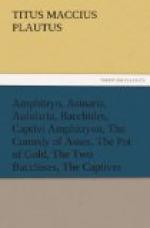Mnes.
Acris postulatio haec est. cum huius dicta
intellego,
mira sunt ni Pistoclerus Lydum pugnis
contudit. 450
(aside)
Here’s a warm protest! Judging from his
remarks,
it’s a wonder
if Pistoclerus hasn’t been punching Lydus’s
head.
Lydus
Sed quis hic est, quem astantem video
ante ostium? o Philoxene,
deos propitios me videre quam illum haud
mavellem mihi.
(looking in the direction of Mnesilochus) But who is this I see standing in front of the door? (recognizing him) Ah, Philoxenus, that is a man whose support I should value no less than that of the gods!
Phil.
Quis illic est?
Who is it?
Lydus
Mnesilochus, gnati tui sodalis.[15]
haud consimili ingenio atque ille est
qui in lupanari accubat.
fortunatum Nicobulum, qui illum produxit
sibi.
Mnesilochus, your son’s chum. And a youth so, so different from the one lolling in that vile house! (pointing to Bacchis’s) Happy, happy Nicobulus to have brought up such a lad!
Phil.
Salvos sis, Mnesiloche, salvom te advenire gaudeo.
(stepping forward)
How are you, Mnesilochus? I’m glad to
see you safely
back.
Mnes.
Di te ament, Philoxene.
(heartily shaking hands) God bless you, Philoxenus!
Lydus
Hic enim rite productust patri: in mare it, rem familiarem curat, custodit domum, obsequens oboediensque est mori atque imperiis patris. hic sodalis Pistoclero iam puer puero fuit; 460 triduom non interest aetatis uter maior siet: verum ingenium plus triginta annis maiust quam alteri.
Ah, yes, here is a son to rejoice a father’s heart: goes to sea, attends to family affairs, is the bulwark of the home, observes and obeys his father’s every wish and word. He was Pistoclerus’s chum even when they were boys—not three days’ difference between them so far as age is concerned, but this lad is more than thirty years his senior in native sense.
Phil.
Cave malo et compesce in illum dicere iniuste.
(angrily)
Look out for yourself, and stop speaking about
the lad unfairly!
Lydus
Tace.
stultus es qui illi male aegre patere
dici qui facit.[16] (464)




